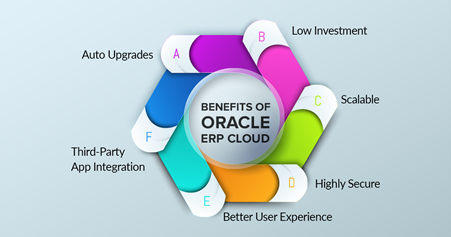In today’s world, the future of a business depends on how well the ERP powering operations can innovate. Real-time information and analytics provide a clear picture of those processes that underperform and, thereby, offer the scope to correct course. Interconnectivity and ease of information sharing encourage collaboration, allowing resources and departments to work with a deeper understanding of what business data means.
For many IT departments of various enterprises, ERP systems mean large, expensive, and time-consuming deployments that require substantial investments in hardware and expertise. Deploying cloud ERP allows businesses to bring down support costs and quickly see a return on investment.
Cloud-based ERP applications have evolved to become end-to-end solutions with multiple features and functionalities equivalent to their on-premise counterparts. Businesses can easily integrate other technologies such as analytics and social tools into the cloud system.

Why Oracle Cloud?
Oracle ERP Cloud is a comprehensive ERP application designed with flexibility and scalability for all kinds of businesses. It promises to deliver higher productivity with improved control. While Oracle offers both local and hybrid cloud deployments to fit business needs and structure, the emphasis is however marked by the shift to a cloud environment.
According to a Business Standard report, Oracle has 8,500 Fusion ERP customers bringing in a 35% increase in revenues. It also has 28,400 NetSuite ERP customers contributing 29% growth in revenues.
With a focus on providing larger and deeper insight into business operations and efficient project execution, Oracle ERP Cloud provides the right combination of collaborative tools needed for a business to streamline workflows and control costs. It consists of the below modules.
Financial Cloud: A complete, integrated, and scalable financial management solution that offers extensive support for global businesses across industries.
Project Portfolio Management Cloud: It is an enterprise-grade solution targeting project-centric businesses; an integrated project financial management that helps improve profitability and perfect project delivery.
Procurement Cloud: It helps streamline the source-to-pay process of a business through automation and social collaboration, in a cost-effective yet profitable manner.
Risk Management Cloud: This comes with embedded AI techniques that automate advanced analysis for ERP role design, segregation of duties (SOX), data privacy (GDPR), and prevent financial fraud.
Migrating to Oracle ERP Cloud
Migration to Oracle ERP Cloud opens up many opportunities for businesses. Further, the process of migration can be carried out seamlessly with the help of the right experts in this business. It is important to first identify all suitable benefits and opportunities of application migration to the most suitable cloud platform. Gemini Consulting & Services is better placed to help growing businesses deploy Oracle Cloud ERP. Contact us to know how our experts can help you unlock maximum value from Oracle ERP Cloud.

Auto Upgrades: Updates and new functionalities are automatically sent to the application online. This eliminates the potential cost in the future for system upgrades while staying assured that the system is up to date.
Low Investment: On-premise ERP software requires businesses to purchase the equipment necessary to run an application as well as teams to maintain it. Oracle ERP Cloud is a subscription-based platform run over the internet, with a much lower entry cost needed for implementation.
Scalable: Oracle ERP Cloud’s most noted benefit is its ability to grow with the business. Whether it applies to process automation of functions like inventory management, or streamlining total costs of ownerships ERP Cloud lends the much-needed advantage for digital transformation and profitability. Oracle ERP Cloud’s scalability benefit makes it a solution option for businesses at all levels. Its size and price tag make it affordable for growing and large businesses to step up and buy a dynamic ERP platform that will support growth.
Highly Secure: Automatic deployment of updates ensures that the system is always up to date with the latest in available security measures. Additionally, cloud data storage can be outsourced to a larger and more secure third-party, saving costs of additional hardware and maintenance.
Better User Experience: Oracle ERP Cloud includes mobile capabilities to keep employees connected and provides agile, real-time analytics to help make informed decisions. This largely helps personalize the experience for both the employee and customer.
Third-Party App Integration: Oracle ERP Cloud’s integrated software suite provides an exhaustive set of tools to help a business realize the complete potential of its ERP system. Existing third-party solutions are available for integration with the existing system.
Oracle ERP Cloud is slowly being adopted by SMBs, over and above midsize and large enterprises, with the number of users within a company ranging from as few as 10 users to an unlimited number of users. Users span industries, including professional services, business services, retail, state and local government, higher education, non-profit, banking, insurance, healthcare, media, and entertainment and communications.
Oracle clients enjoy access to the latest system enhancements with the flexibility to decide when they want to upgrade their systems for the same. Oracle ERP Cloud is built on open industry standards and can be accessed via common all web browsers such as Chrome, Safari, Internet Explorer or Edge. Oracle also operates its own data centers around the world, which facilitates handling redundancy and failover across multiple locations.



